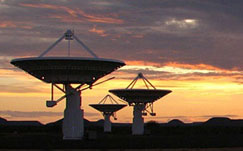South African university plans telescope
29 June 2015
The University of KwaZulu-Natal (UKZN) was embarking on a cutting edge legacy
project to build a R70-million radio telescope, Professor Kavilan Moodley said
yesterday.
Moodley, who works at the university's astrophysics and cosmology research
department, was speaking on the sidelines of a two-day annual astronomy meeting
in Umhlanga, Durban.
"The university is building a telescope called the Hirax which is [a] hydrogen
intensity mapping and real time analysis experiment," he said.
"We conceptualised the project over a year ago and submitted our proposal to the
National Research Foundation [NRF] to fund it. It is being supported through a new
programme at the foundation called the Institutional Engagement Programme
Directorate.
"The NRF is going around the country asking universities what is the one thing that
they want to be known for," said Moodley. This would be UKZN's legacy project.
"It's actually
[planned to be] 1 000 dishes… of 6m diameter each. We will start
developing them in Durban then we are going to build a prototype of about eight
dishes to test the system out and then beyond that we plan to put 128 of these
dishes in the Karoo near the MeerKAT project," he said.
If it was successful, the project will be expanded to the 1 000 dishes. UKZN was
supporting it because it would be at the cutting edge of astronomy, Moodley added.
"The Hirax will assist us to be able to look back in time and what that means is that
we will be looking out into the universe. We will be looking to a few billion years
after the beginning of time.
"There is a lot of interesting science we can do with the Hirax. The city has
indicated to us that we are going to develop a site here and we are also going to be
working on the project with the Durban University of Technology.
"We have one dish at the harbour that has arrived for the telescope. [It] was
constructed by our international partners so we are now going to start working on
it. We will collaborate with the city on the project because they have indicated that
they have strong support for the project. We haven't decided where the dishes will
be."
With a budget of about R70-million, the project was actually "quite cheap as big
telescope projects like the MeerKAT cost billions of rands".
"UKZN is contributing a significant amount. We have funded the first phase, which is
building 128 dishes, and we are planning to get input from the NRF and our
international partners on how else we can get funding," said Moodley.
Source: News24Wire




